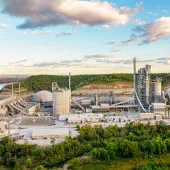Mannok in new partnership with FLSmidth
Decarbonization research project aims to maximize SCMs in cement composition via digitalization
A NEW research effort is being led by FLSmidth, with the support of various partners, including Mannok, to utilize digitalization and advanced predictive modelling to maximize the use of supplementary cementitious materials in cement, a key pillar to decarbonize cement.
Supplementary cementitious materials (SCMs), which will play a key role in the cement industry’s pathway to net zero, cover a range of materials from natural pozzolans to calcined clay and industrial by-products such as fly ash, blast-furnace slag, silica fume and, recently, recycled concrete fines and mining tailings.
SCMs have a lower carbon footprint than traditional Portland clinker used in cement production. Thus, clinker substitution with SCMs represents a ‘sure-fire way to reduce CO2 emissions,’ according to Dr Wilson Ricardo Leal da Silva from FLSmidth’s Green Innovation team. ‘The ultimate goal is to reduce the clinker factor from about 70% today to 40% by 2030, targeting CO2 emissions of 0.2 tonnes CO2 per tonne of cement,’ he explained.
But there are challenges to overcome. While the use of SCMs is likely to increase in cement in the coming years as cement plants press to lower their emissions, it can be complicated for a single plant to transition between various SCMs. ‘In this context, being able to switch between SCMs quickly and flexibly will provide a competitive advantage to cement and concrete producers,’ continued Dr Leal da Silva.
To address these challenges, FLSmidth are leading a new research partnership titled DETOCS (Data Enabling Transformation and Optimization towards Concrete Sustainability), which will be officially launched in September 2023.
‘Cement plants already gather vast amounts of operating data. Our ambition is to combine this data and fundamental understanding of cement chemistry to create advanced predictive models, allowing cement plants to quickly adapt and optimize their processes to new SCMs and produce very low-carbon cement on demand,’ said Dr Leal da Silva.
As the development of such a model requires an interdisciplinary effort, DETOCS includes experts in material science, data science, and technical standards, as well as process engineers and cement producers.
The project comprises the following industrial and academic partners: FLSmidth, Cementos Argos, C2CA Technology BV, Centre National de la Recherche Scientifique, Erasmus University Rotterdam, École Polytechnique Fédérale de Lausanne, Environmental Coalition on Standards, ETH Zürich, Imperial College London, Massachusetts Institute of Technology, ParticleTech ApS, RWTH Aachen, Statwolf, TU Delft, University of Padova, Mannok, University of Aberdeen, and Université Grenobles Alpes.
Breakthrough Energy, the German Cement Association, Kline Consulting, and Kompas Venture Capital comprise the external advisory board.
The project consortium will support 15 PhD students, with each doctoral candidate gaining interdisciplinary knowledge needed to deliver game-changing cleantech innovations, while contributing to develop a novel engineering solution that helps decarbonize cement.
Commenting on Mannok’s partnership in the research, Mannok process manager Mark Gilmore said: ‘From the publication of our sustainability strategy, the Mannok 2030 Vision, it is evident that we are facing the cement decarbonization challenge head on, engaging with our academic and industrial partners and investing in the innovations that will play a crucial role in decarbonizing the cement industry.
‘Earlier this year we completed a separate RD&I project with FLSmidth – the development of a world-first technology, the FUELFLEX Pyrolyzer, which has enabled us to displace 90% of our coal use with SRF (solid recovered fuels) in the pre-calcination stage of cement production. Not only was this a major milestone in the decarbonization of our plant, but it was also a valuable, unique and exciting experience for our team to be a part of, aiding their own personal development.
‘We are very pleased to be working with FLSmidth on another innovative research project. Displacing traditional Portland clinker and maximizing new SCMs in cement production will be a major game-changer for the cement industry, as clinker is responsible for the majority of cement’s carbon emissions. The success of this project is crucial to decarbonizing the cement industry, and the team and I look forward to contributing to the international research.’










